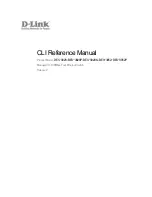
DES-3028 DES-3028P DES-3028G DES-3052 DES-3052P Layer 2 Fast Ethernet Switch CLI Reference Manual
5
DES-3028P:4#config account
Command: config account
Next possible completions:
<username>
DES-3028P:4#config account
Command: config account
Next possible completions:
<username>
DES-3028P:4#
Figure 2-4. Using the Up Arrow to Re-enter a Command
In the above example, the command
config account
was entered without the required parameter
<username>
, the CLI returned
the
Next possible completions: <username>
prompt. The up arrow cursor control key was pressed to re-enter the previous
command (
config account
) at the command prompt. Now the appropriate username can be entered and the
config account
command re-executed.
All commands in the CLI function in this way. In addition, the syntax of the help prompts are the same as presented in this manual
angle brackets < > indicate a numerical value or character string, braces { } indicate optional parameters or a choice of
parameters, and brackets [ ] indicate required parameters.
If a command is entered that is unrecognized by the CLI, the top-level commands will be displayed under the
Available
commands:
prompt.
DES-3028P:4#the
Available commands:
.. ? cable_diag clear
config create debug delete
dir disable download enable
login logout ping reboot
reconfig reset save show
smtp telnet traceroute upload
DES-3028P:4#
Figure 2-5. The Next Available Commands Prompt
The top-level commands consist of commands such as
show
or
config
. Most of these commands require one or more parameters
to narrow the top-level command. This is equivalent to
show
what?
or
config
what? Where the what? is the next parameter.
For example, if users enter the
show
command with no additional parameters, the CLI will then display all of the possible next
parameters.











































